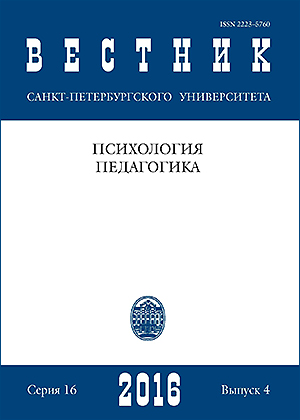Characteristics of Interaction Between Institutionalized Children with Respect to Age
DOI:
https://doi.org/10.21638/11701/spbu16.2016.410Abstract
Th is study examined the interaction between institutionalized infants and young children living in diff erent orphanage (baby home) environments in relation to their age. Results revealed that children from family type baby homes in comparison with children from traditional baby homes demonstrate the age-related changes in the majority of interaction parameters and in the total sum of all interaction parameters, which may indicate the development of greater social competence. The age-related changes were found to be observed mostly in the group of typically developing children, whereas children with special needs in both types of baby homes have not demonstrated changes in interaction parameters. Th e results of the study are discussed in relation to the infl uence of the quality of social emotional environment on the development of children in baby homes.
Keywords:
institutionalized infants and young children, interaction between children, social emotional environment in orphanage, typically developing children, children with special needs
Downloads
References
References
Downloads
Published
How to Cite
Issue
Section
License
Articles of "Vestnik of Saint Petersburg University. Psychology" are open access distributed under the terms of the License Agreement with Saint Petersburg State University, which permits to the authors unrestricted distribution and self-archiving free of charge.




